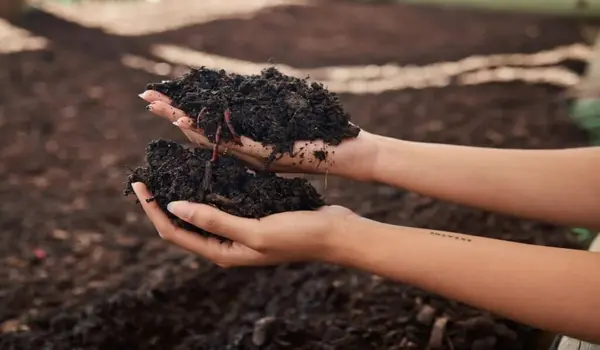Composting is a cornerstone of organic farming, offering a wealth of benefits that align with the principles of sustainability and soil health. By transforming organic waste into nutrient-rich compost, farmers can enhance their agricultural practices, improve soil fertility, and promote a more resilient farming system. This blog explores how composting contributes to the success of organic farming and how Humic Factory's products can support this essential process. Composting is the process of decomposing organic materials, such as plant residues, food scraps, and manure, into a dark, nutrient-rich substance known as compost. This natural process relies on microorganisms, including bacteria, fungi, and earthworms, to break down organic matter and create a valuable soil amendment. Composting significantly boosts soil fertility, which is vital for successful organic farming: A healthy soil ecosystem is critical for sustainable organic farming, and composting plays a crucial role: Composting is an effective waste management practice that also benefits the environment:Understanding Composting in Organic Farming
1. Enhancing Soil Fertility
Nutrient Supply: Compost provides essential nutrients, including nitrogen, phosphorus, and potassium, in a slow-release form. These nutrients are readily available to plants, supporting healthy growth and development.
Microbial Activity: The application of compost increases the population of beneficial soil microorganisms. These microbes help break down organic matter, enhance nutrient availability, and improve soil health.
Soil Structure: Compost improves soil structure by increasing its organic matter content. This results in better soil aeration, water retention, and drainage, creating an optimal environment for root growth.
2. Supporting Soil Health
Disease Suppression: Compost can suppress soil-borne diseases by promoting the growth of beneficial microorganisms that outcompete harmful pathogens.
Erosion Control: By improving soil structure and increasing organic matter, compost helps prevent soil erosion, which is essential for maintaining fertile topsoil and preventing degradation.
pH Balance: Compost helps buffer soil pH, reducing soil acidity or alkalinity and creating a more stable environment for plant growth.
3. Reducing Waste and Environmental Impact
Resource Efficiency: By recycling organic waste into compost, farmers can reduce their reliance on synthetic fertilizers and chemical amendments, which aligns with the principles of organic farming.
Carbon Sequestration: Composting contributes to carbon sequestration by increasing soil organic carbon, which helps mitigate climate change and improve soil health.
4. Enhancing Crop Productivity
Compost application can lead to improved crop productivity and quality:
Increased Yield: Plants grown in compost-enriched soil often exhibit higher yields due to better nutrient availability and improved soil conditions.Improved Quality: Compost can enhance the nutritional quality and flavor of crops, making them more attractive to consumers and increasing their market value.
Stress Tolerance: Compost helps plants better withstand environmental stresses, such as drought and extreme temperatures, by improving soil structure and water-holding capacity.
5. Supporting Sustainable Practices
Composting aligns with the principles of sustainable agriculture by promoting ecological balance and resource efficiency:
Natural Fertility Management: Composting provides a natural source of fertility, reducing the need for synthetic inputs and promoting self-sustaining agricultural systems.Biodiversity: By fostering a healthy soil ecosystem, composting supports a diverse community of soil organisms, which contributes to overall farm biodiversity.
Long-Term Sustainability: Regular composting practices contribute to long-term soil health and fertility, ensuring the sustainability of farming operations for future generations.
How Humic Factory’s Products Support Composting
Humic Factory offers products that complement and enhance the benefits of composting in organic farming:
Humic Acids: Humic acids from Humic Factory improve compost quality by enhancing nutrient availability and microbial activity. They also help in the stabilization of compost, ensuring its effectiveness as a soil amendment.Organic Amendments: Humic Factory’s organic compost and soil conditioners provide additional nutrients and support the overall composting process. These products help create a more balanced and fertile compost.
Biofertilizers: Humic Factory’s biofertilizers can be used in conjunction with compost to further boost soil microbial activity and improve plant health.
Soil Conditioners: Products designed to enhance soil structure and moisture retention work synergistically with compost to create optimal growing conditions for crops.
By integrating Humic Factory’s products into composting practices, farmers can maximize the benefits of composting, enhance soil fertility, and achieve greater success in organic farming.
Conclusion
Composting is a fundamental practice in organic farming, offering numerous benefits for soil health, crop productivity, and environmental sustainability. By enhancing soil fertility, supporting soil health, and reducing waste, composting contributes significantly to the success of organic farming operations. Humic Factory’s products further support composting efforts by improving compost quality and soil health. Embracing composting and utilizing effective products can help farmers build a more resilient, productive, and sustainable farming system. Through thoughtful composting practices and innovative solutions, farmers can achieve long-term agricultural success while promoting environmental stewardship.





